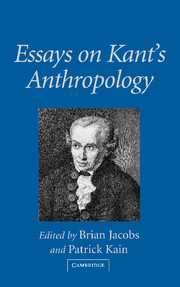Book contents
- Frontmatter
- Contents
- Contributors
- Essays on Kant's Anthropology
- 1 Introduction
- 2 Historical Notes and Interpretive Questions about Kant's Lectures on Anthropology
- 3 Kant and the Problem of Human Nature
- 4 The Second Part of Morals
- 5 The Guiding Idea of Kant's Anthropology and the Vocation of the Human Being
- 6 Kantian Character and the Problem of a Science of Humanity
- 7 Beauty, Freedom, and Morality: Kant's Lectures on Anthropology and the Development of His Aesthetic Theory
- 8 Kant's Apology for Sensibility
- 9 Kant's “True Economy of Human Nature”: Rousseau, Count Verri, and the Problem of Happiness
- 10 Prudential Reason in Kant's Anthropology
10 - Prudential Reason in Kant's Anthropology
Published online by Cambridge University Press: 19 July 2009
- Frontmatter
- Contents
- Contributors
- Essays on Kant's Anthropology
- 1 Introduction
- 2 Historical Notes and Interpretive Questions about Kant's Lectures on Anthropology
- 3 Kant and the Problem of Human Nature
- 4 The Second Part of Morals
- 5 The Guiding Idea of Kant's Anthropology and the Vocation of the Human Being
- 6 Kantian Character and the Problem of a Science of Humanity
- 7 Beauty, Freedom, and Morality: Kant's Lectures on Anthropology and the Development of His Aesthetic Theory
- 8 Kant's Apology for Sensibility
- 9 Kant's “True Economy of Human Nature”: Rousseau, Count Verri, and the Problem of Happiness
- 10 Prudential Reason in Kant's Anthropology
Summary
For all pragmatic doctrines are doctrines of prudence, where for all our skills we also have the means to make proper use of everything. For we study human beings in order to become more prudent…
Anthropology Friedländer 25: 471Anthropology should have a prudential or pragmatic orientation, according to Kant, a thought emphasized in the title of his 1798 “textbook,” Anthropology from a Pragmatic Point of View. According to the Parow notes (1772–3) of an early lecture course on anthropology, Kant described prudence as “the capacity to choose the best means to our happiness” (25: 413), a description that fits well with his suggestion in the Groundwork that prudence is “skill in the choice of means to one's own greatest well-being” or happiness, or “the insight to unite all [one's own] purposes to his own enduring advantage” (G 4: 416). While Kant is quick to contend that the prudent pursuit of well-being or happiness is not the only or the most dignified purpose of practical reason (this esteemed place is reserved for morality), he insists that, in a finite rational agent,
reason certainly has a commission from the side of his sensibility which it cannot refuse, to attend to its interest and to form practical maxims with a view to happiness in this life and, where possible, in a future life as well
(KpV 5: 61).- Type
- Chapter
- Information
- Essays on Kant's Anthropology , pp. 230 - 265Publisher: Cambridge University PressPrint publication year: 2003
- 32
- Cited by



